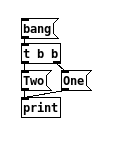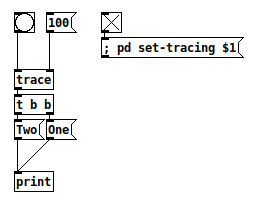@ddw_music said:
"Return to caller" as in any structured or object-oriented language is nicer
I think this thread may have convinced me that the idea of return to caller is antithetical to dataflow, it goes against the flow of data and my solution which you said side stepped it is just restating the problem into dataflow. Not that this was my intent, didn't even realize I sidestepped it until you mentioned it but it got me thinking. Not sure if it is even possible or practical to avoid but I think I am going to try and be more rigid with the flow of data for awhile and see what happens.
Here, I'm referring specifically to
That is what I originally thought but the previous post confused me, I now realize that you weren't addressing my patch directly but offering a summation of what you got from the thread in your reply to me.
whereas most other solutions posted here seem to assume it will always be a single float):
Just replace [array] with [text] and make a tiny change in stream.pd/add other abstractions asStream can load/change the arguments it is loaded with. I switched from [text] to [array] because you used an array in your SC example and I switched tactics to confront your example head on. Originally I thought your ignoring the suggestion of [value] was that you wanted to use things other than floats and then thought that what you were having issues with is the methodology. This is probably a part of the problem porres mentioned about people having issues transitioning to pd from another language, you have a good grasp on programming and when you ignore a solution which seems the easy/obvious solution to us it is easy to assume you have a good reason for ignoring it. These sorts of assumptions are probably reasonably common in such situations, we all gave up on the suggestion of [value] early on and it came back into the discussion purely on accident.
It has been an interesting thread, the failures in communication ended up surprisingly insightful on many fronts.






 They're structured, provide a convenient way for exiting deeply nested loops, and feel similar to Java's exception framework.
They're structured, provide a convenient way for exiting deeply nested loops, and feel similar to Java's exception framework. well, there's a time and place for everything. There are gotos in SuperCollider's C++ codebase, iirc mainly in the long
well, there's a time and place for everything. There are gotos in SuperCollider's C++ codebase, iirc mainly in the long